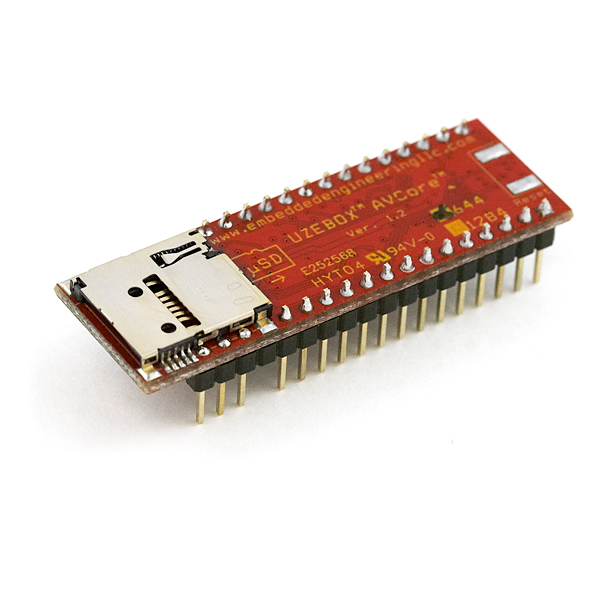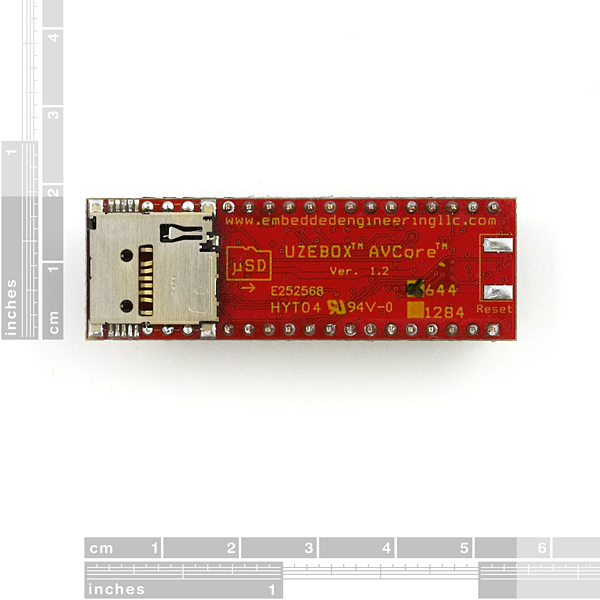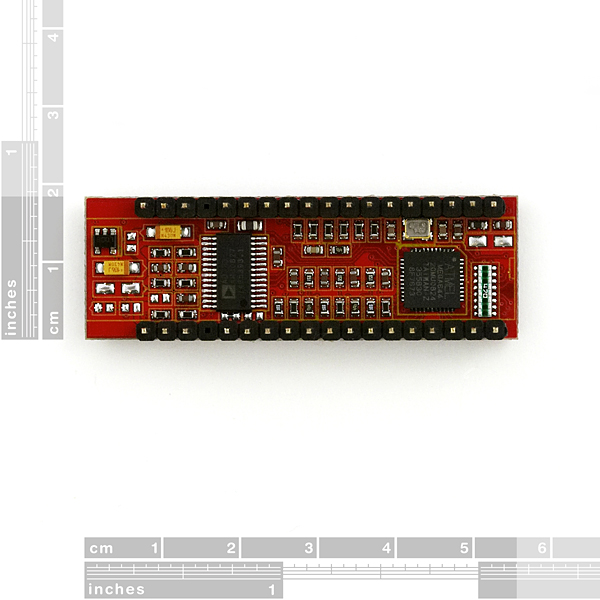Uzebox AVCore Development Module
Replacement: None. It's time for this product to step aside and make room in the catalog for even more cool stuff. This page is for reference only.
The AVCore is an AVR based, 40-pin DIP, computing module. Onboard is an ATMega644 microcontroller, an Analog Devices AD723 NTSC video encoder, a micro SD card socket, and support circuitry. When combined with the open-source Uzebox kernel, the AVCore can produce full color, NTSC compatible video and audio. The AVCore requires only a 5VDC power input and a connection to a TV or monitor to produce color graphics, text, and multi-voice sound and music.
So what do you do with all this power? Check out the SparkFun ESD Attack game! The Uzebox was designed as a simple and low cost game console to help people create their own games.
The AVCore's default firmware is programmed in C (using the free AVRWin/GCC tools along with AVR Studio under Windows, or command line utilities under Linux). All audio and video generation is automatically taken care of under interrupt control-- user programs do not need to be concerned with the low-level operation of the system.
The AVCore module outputs a composite video signal in addition to s-video (luma/chroma) and analog RGB with separate negative going composite sync outputs. Audio is provided as a line level output.
Twenty-one general purpose I/O lines from the ATMega644 are available on the package including SPI, serial (TxD/RxD), INT0, ADCs, and others. The ATMega644 is overclocked to 28.636MHz to provide a significant amount of processing power at a rate compatible with NTSC television signals. Components are mounted on the bottom side of the module to help prevent damage.
The Uzebox kernel is capable of producing NTSC compatible video in resolutions up to 240x224 pixels with 256 colors. Sprites, horizontal and vertical scrolling, split screen regions, animation and other effects are all accomplished in software. A four channel wavetable synthesizer is included as well as a PCM audio sample playback mechanism. All audio voices are individually pitch and timbre controllable and mixed with adjustable volume levels in realtime.
Simply plug the AVCore into the Uzebox Baseboard and you have the official Uzebox development platform; 100% compatible with the Uzebox specification. Plug the AVCore in to your own design to add high quality audio, video, and micro SD storage to your own project.
**Note: **You must use a regulated 5VDC input for power.
- ATMega644 Microcontroller
- 4K of RAM
- 64K Program Memory
- 28.61818 MHz overclocked
- 256 colors with a 3:3:2 color space (RGB)
- Up to 240x224 resolution
- 32 simultaneous 6x8 pixels sprites
- NTSC video out, S-Video, and RGB
- 4 Channel sound wavetable, 8-bit mono
- 5VDC power at about 100mA (generating audio and video)
- micoSD card socket
- 21 pinouts, see schematic
- Uzebox Project Homepage
- Schematic
- Hex files
- ESD Attack Source Code
Uzebox AVCore Development Module Product Help and Resources
Comments
Looking for answers to technical questions?
We welcome your comments and suggestions below. However, if you are looking for solutions to technical questions please see our Technical Assistance page.
Customer Reviews
No reviews yet.




The module does take a 5VDC input (since it's slightly overclocked to a multiple of the NTSC video frequency it needs the extra voltage margin for the speed). I think what you're seeing on the schematic is actually the 3.3V regulator that's necessary to power the micro SD card. That is included on the module-- you just give the module 5VDC in and it should be happy. (The Gamer Baseboard uses a Sparkfun 5V DC power adapter to power the module.)
If you're reading the Uzebox forums, there were earlier versions that did have a 3.3V input, but there were a couple chips that wouldn't run full speed at 3.3V, so I changed it to 5V to be safe.
Hope you have fun with it!
I noticed that the updated schematic for the AVRCore module shows that it takes 3.3v as power input, yet the description for the module on your website states that it takes 5vdc. I really don't want to blow up my new $60 toy and I also don't want to be frustrated trying to figure out a problem that is due to too low of a power supply voltage.
Could you tell me which is correct?
THIS IS AWESOME, I have been planning on building one of these for months now, This will make it much much easier.
Thank you spark fun!